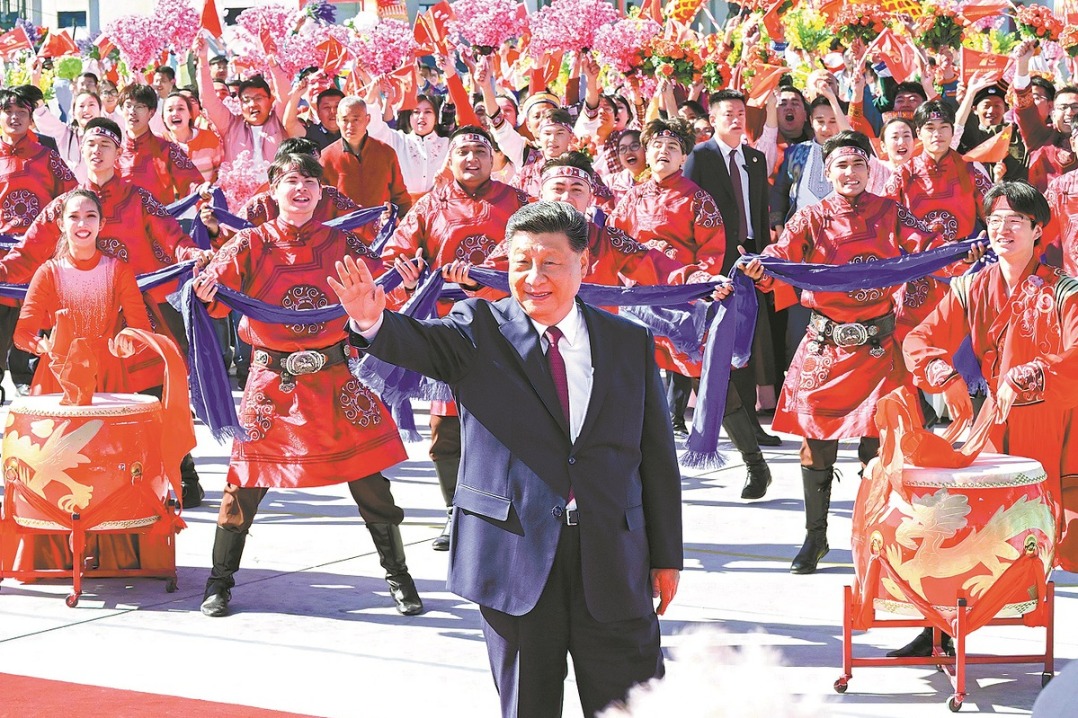Coal mine machinery maker goes green

In a 70,000-square-meter factory in Zhengzhou, Henan province, the hum of machinery blends with precise robotic movements as the traditional industry stronghold goes digital.
At Zhengzhou Coal Mining Machinery (Group) Co, robots now handle unloading and sorting materials, while automated systems powered by 5G and the internet of things manage welding and cutting.
"We've digitalized the entire production process, doubling efficiency," said Wang Yongqiang, deputy manager of the company, adding that the digital factory is "key to our low-carbon, smart and efficient growth".
Founded in 1958, the company has grown into the world's largest fully mechanized coal mining technology and equipment supplier, continually raising global standards in mining support systems.
Over the years, as green and digital technologies have advanced, companies like Zhengzhou Coal Mining Machinery are transitioning to more sustainable and intelligent production methods.
The shift aligns with China's commitment to peak carbon dioxide emissions by 2030 and achieve carbon neutrality by 2060. As it marked its second National Ecology Day on Thursday, it is steadily progressing toward those goals.
According to recent official guidelines, China will prioritize the green transition across all socioeconomic development areas, with a focus on green and low-carbon shifts in industrial structures. The goal is to establish an economic system centered around green, low-carbon and circular development by 2035.
While Zhengzhou showcases the power of digitalization in heavy industry, the coastal city of Nan'an in Fujian province, demonstrates how green technologies are reshaping light manufacturing sectors.
JOMOO, a bath and kitchen brand known for its energy conservation efforts, previously used hundreds of LED lights on each production line using injection molding machines, according to manufacturing manager Yang Zhiyang.
But robots now work without lighting, saving around 1,000 kilowatt-hours of electricity a day, and the factory's solar panels — installed on the rooftops — can cover most of its daytime power needs, Yang said. The company saves over 100 million kWh a year, which cuts its carbon footprint by more than 18,000 metric tons.
In Nan'an, over 100 companies have largely reduced carbon emissions, saved energy and lowered pollution levels, said Huang Ziya, director of the city's bureau of industry and information technology.
The dedication to green and low-carbon development across various industries is also reinforced by a series of targeted policies. The action plans for the electrolytic aluminum industry and data centers target energy-saving retrofits, fossil fuel replacement and green development, with a focus on energy-efficient upgrades and modernizing power equipment.
Digital and green technologies are also driving sustainable industrial transformation. In Kunming, Yunnan province, a former phosphate mine has been transformed into a flourishing apple orchard. Since 2017, over 20 hectares of damaged land have been revitalized with smart farming methods and advanced agricultural techniques.
By leveraging the internet of things, the project has optimized water and fertilizer use, while a solar-powered cooling system efficiently preserves the apple harvest, demonstrating how renewable energy reduces costs and enhances sustainability.
Xinhua
- Taiwan leader's pro-Japanese-aggressor remarks draw widespread criticism amid war commemorations
- Shanghai lays on design extravaganza at world cities conference
- Escaped snow leopard found safe in Xining Wildlife Park
- Six injured, buildings damaged in Gansu earthquake
- Houses collapse after earthquake hits rural area of Gansu
- New Fengyun satellite to boost China's global weather forecasting




































